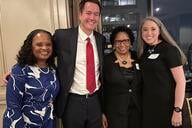You have /5 articles left.
Sign up for a free account or log in.
A number of years ago, when I was a boy visiting my grandmother in West Berlin, I escaped from the apartment. I loved my grandmother, but an eight-year-old can only stand so many hours of lace doilies and plumb cake. As I was exploring the cobbled streets of her quiet neighborhood, an elderly man stopped me to ask directions to a store. I answered that I didn’t know. He noted my accent.
“Where are you from?”
“America,” I said.
“What are you doing in Berlin?”
In my best pidgin German, I told him the story of how my father had served in the Air Force and married a German girl, and now I spent summers visiting my mother’s family in Berlin.
The man, in turn, told me how wonderful America was, how Americans are such great friends to Berliners. The conversation stirred in me a funny feeling of national pride over something I didn’t earn.
I would eventually learn a little history. I would understand that this little walled island I visited was an outpost of freedom on the dark side of the Iron Curtain. I realized that when the old man thought of my father’s service, he probably recalled the Berlin Airlift. Upon hearing my clumsy accent, he might have remembered of President Kennedy’s proclamation of solidary in equally shaky German: “Ich bin ein Berliner.” I am a Berliner.
A few years later, another American president made a speech in Berlin, urging the Soviets to, “tear down that wall.” And a short time later, indeed the Berlin Wall did come down. Peacefully. Joyfully.
This was around the same time that I began to recognize power inherent in words. I understood that words, when you put them in the right order, can do some pretty magical things. I initially wanted to be the next Ernest Hemingway or Jack Kerouac, but instead I’ve wound up a higher education communicator. And I suppose I’m glad, because those other guys were sort of jerks.
Now I work with a team that uses words and stories to snare students, sway legislators and inspire donors with tales of invention, discovery and human triumph. Some of the projects we get to work on are pretty dramatic: the peace process in Colombia, the threat of ocean acidification, an ex-con who walks in the graduation ceremony in front of his entire family.
When crafting university communications we can see the results of our work. Sometimes we’re successful, and other times we fall flat. But I have seen how our work can help to shape a culture and cobble together a coalition of disparate people and shape them into this big, diverse and sometimes dysfunctional family we know as the university.
But now, some members of that family are under direct attack. Executive actions in faraway capitol on the opposite coast from our little college town are stoking fear and anxiety. There’s talk of a new wall going up on the southern border that is aimed specifically at one group in our midst. A travel ban and “extreme vetting” targets another.
Large research universities like ours have many students from countries around the world, including those affected by the ban. And because our state of Oregon encourages qualified undocumented students to attend our universities, it’s likely we have students from this group as well. I can’t imagine the stress this causes. After all, I’m used to my magic blue passport, that American badge of privilege that allows me to visit most countries in the world without a visa, an instant ticket to the fast lane in immigration lines.
For others, that immigration line has become a painful, frightening experience. One of our international students recently blogged about the “anxiety, uncertainty, ambiguity and insecurity” that has settled in after the travel bans were enacted. He wrote about how his immigration interview scared him “to death.”
But just as I feel that flicker of national pride begin to falter, this same student gives me hope. He hasn’t given up on us. He still believes that America is the “land of opportunity.” Even though some of his friends back home are questioning and even canceling plans to study here, he finishes his post in the following burst of optimism:
“Just as a few people are striving to erect walls, even more are striving to bridge the gaps.”
And what allows him to keep the faith in the possibility of this place, to see through the fear and frustration? It’s the little things. It’s the small acts of kindness from people who he’s met here that “wiped away those harsh moments.”
Small things matter. Random acts of generosity matter. Reassuring words help. Like many universities around this country, ours is a “sanctuary campus.” Our university president issued a strong statement to the community about the executive orders, urging us to “reaffirm our compassion and commitment to one another as a community regardless of immigration status, background or identity.” Many other university presidents have issued similar statements.
And as marketers and communicators, it is time to follow up on the promise of what it means to be a sanctuary campus. I realize that it’s a politically charged atmosphere, and even basic human kindness can be seen as a partisan act. But I believe that those of us whose trade is in words, stories and messages should employ those skills in support the community that we’ve helped attract to our campus. We have social networks, posters, banners, videos and any number of analog and digital channels at our disposal, and now is our chance to use them for a vital purpose. I’m encouraging colleagues to reshape their plans, to shift priorities and donate their time and talents to the cause of human kindness.
I met with Salar Khan, the author of the post, for coffee to get his thoughts. I asked him if things like banners and videos that have messages of welcome and support from the university would make a difference. “Of course,” he said, with a finality that suggested the answer should have been obvious.
I shouldn’t have been surprised. Salar has only been in Corvallis for a year and half, but he’s quickly become a part of the community. He’s been involved in rejuvenating the Muslim Student Association on campus. He’s particularly proud of the group’s diversity and the fact that half of the officers are women. He’s participated in interfaith organizations in town and volunteered at a senior center. He’s done more to connect with this community than I have in the eight years I’ve been here. When you think that the blunt instrument of misguided policy is affecting people like him around this country, inaction no longer seems like a reasonable option.
So what kinds of messages can we use to show the affected members of our university communities that they are welcome and that they have our support? It’s probably another obvious answer. We just need to think back to President Kennedy: “Ich bin ein Berliner.” I am a Berliner. I am one of you. Our university, this community, our nation is with you.
Or to be politically inclusive, maybe we can quote Reagan. “Tear down that wall.” Because words have weight. And when you use them in the right way, you can change the world—one little act of kindness at a time.
David Baker is a writer and media producer who works in interactive communications at Oregon State University.




